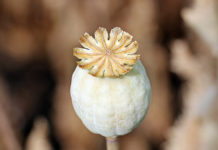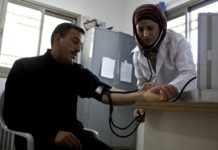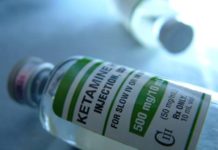Greed Disguised as Science: How a Multitude of Factors Led to the Opioid Crisis
Opioids are now the leading cause of mortality from overdose, accounting for 91 deaths every day. The context and key players that created and contributed to the opioid epidemic must be brought into sharp focus if we are to have any hope of stemming the tide of this public health crisis.
More to Happiness Than Feeling Good, Study Finds
Cross-cultural data suggest that happiness involves feeling the emotions one deems as right, in accordance with personal and cultural values.
Abduction
The following are some excerpts from my journal about my inpatient experience. Please know that the people in that hospital often reached out to one another in beautiful ways, but overall felt frustrated and stressed due to an oppressive and sterile environment with little positive reinforcement.
Psychiatry’s 12-Step Program for Producing Heroin Addicts
I believe that today’s heroin addicts are a new breed — the seeds of their creation were sown back in 1990, when doctors’ lies about normal childhood immaturity being a genetic “brain illness” became accepted. Here are some statistics that support my argument that psychiatry is the root cause of our heroin epidemic.
Study Finds Recalling Experiences of Violence Impairs Cognitive Functioning
Recalling past exposure to violence worsens short-term memory and cognitive control.
House on Fire: A ‘Mental Health Literacy’ Parable
This fictitious conversation between a client and therapist highlights a number of problematic views and practices commonly encountered in the mental health system. Although they may not “blame the brain” as often as psychiatrists, many therapists have also adopted the DSM-based biomedical framework in their work.
Increased Risk of Movement Disorders From Antipsychotics in Persons with Intellectual Disabilities
Large cohort study demonstrates that those with an intellectual disability are at an increased risk for movement disorder side effects of antipsychotics.
Some Thoughts About Conferences
Without judging the motivation of people presenting and speaking at conferences, I’d like to ask the question: can we achieve more with these conferences than generating knowledge and touching people's hearts? Are we preparing the ground for change or are we marking time?
Researchers Argue that ‘ADHD’ Doesn’t Meet DSM Definition of a Disorder
New research questions whether the diagnosis of ADHD even meets the criteria for a disorder, as set out in the manuals used by the medical and psychiatric fields.
Peter Breggin, MD: The Conscience of Psychiatry
On this episode of the MIA Radio podcast, we present part one of an interview with Dr. Peter Breggin about his career, his views on psychiatry and recent developments with the Michelle Carter trial in which he testified as an expert medical witness.
The Winding Road and the Importance of Going Sideways
The winding path is very often the only path that a human being can follow. It has to become an acceptable path. We have to stop pushing young kids because WE want them to be somewhere without regard to what they are ready for.
How to Avoid Severe SSRI Withdrawal Symptoms?
After long-term use, most people are going to have serious symptoms when stopping SSRIs. Many people are going to have transient, mild to moderate difficulty and some are going to end up falling down the akathisia rabbit hole. That is a long, difficult drop.
Married Individuals with Schizophrenia Show Better Outcomes, Study Finds
14-year study of a rural sample in China shows those who were married had higher rates of remission from schizophrenia.
Waking Up is Hard to Do
Finally I’m moving in the right direction, rescuing myself from the pernicious grip of psychotropic drugs. It’s been exceptionally challenging, dealing with the adverse physiological reactions my body’s been going through. Waking up may be the toughest thing to do. Ultimately, the way I see it, it’s the only thing to do.
Social Prescribing May Improve Self-Esteem and Mental Well-Being
Systematic review suggests social prescribing benefits individuals with mental and physical health issues, but more program evaluations are needed.
Spiritual Side Effects of Psychiatric Medication: From Helpful to Harmful
The larger narratives put forth by psychiatry and neuroscience often eclipse the equally important stories of lived experience. The easiest way to understand how people are engaging spiritually with their prescriptions is to hear it in their own words.
Patients With Schizophrenia Show Better Work Functioning Off Antipsychotics
20-year follow-up study finds that after four years, patients not prescribed antipsychotics have significantly better work functioning.
“Virtual Autism” May Explain Explosive Rise in ASD Diagnoses
New clinical case studies have found that many young children who spend too much screen time—on TV’s, video games, tablets and computers—have symptoms labeled as “autism.” When parents take away the screens for a few months the child’s symptoms disappear.
Researchers Find Inadequate Reporting of the Dangers of Ketamine Treatment for Depression
Researchers report that dangerous side effects are not being adequately reported in the trials of ketamine for depression.
New Collaborative and Feedback-Informed Family Therapy Approach
Attempts to bridge the gap between research and practice result in a family therapy approach which employs clients as co-researchers.
Little Porcupine Goes to the Psych Ward
I was so anxious about having to raise three boys alone that I felt I was going insane. So I thought of going to see a psychiatrist. I was looking for Carl Jung. Instead I found a system where they give you pills, whether you need them or not.
Prescription for Murder ABCD
The Anything But the Company Drug playbook involved digging deep into the medical records of the person reporting a problem in order to find the ingrown toenail at the age of two that was possibly the cause. And of course if something else was possibly the cause, then we can’t conclude that our drug did it.
Prenatal Exposure to Psychotropic Medication Linked to Long Term Cognitive Impairment
School aged children exposed prenatally to psychotropic medication show poorer outcomes in cognitive ability.
Study Suggests Mania More Common in Psychosis When Antidepressants Used
A prospective cohort study of those labeled high risk for psychosis finds a higher prevalence of antidepressant use among those who develop manic symptoms.
Death By Placebo
When people waste all their time and effort on futile attempts to fix fake chemical imbalances instead of addressing their real issues (since there supposedly are none), their issues will persist and build up. Hyping placebos to be miracle pills thus builds up false hopes, which sets a person up for big letdowns that can lead to suicide.

































